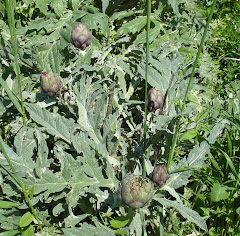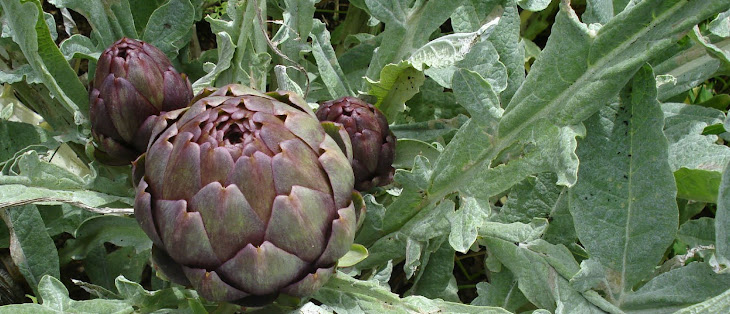I've mentioned before the amazing efforts that Cuba has made to develop self-sufficient organic agriculture due to the economic isolation it has experienced since the collapse of the Soviet system in 1990. Cuba has had to make the sort of adjustments to industry and agriculture which we will all have to make as oil production declines over the coming decades. Putting political arguments aside, there is much to admire here. The country has progressed from reliance on imports and industrialised, chemically fertilised agriculture and horticulture to locally based organic fruit and vegetable production. In the capital city, Havana, 50 per cent of the food needed for the population is produced within the city in community gardens and roof terraces. In smaller towns 80 to 100 per cent of food is grown within 5 km.
Depuis l'effondrement du système Sovietique en 1990, Cuba doit développer un système d'agriculture biologique et autosuffisant. À Havana, la capitale du pays, ils produisent 50 pour cent de la nourriture dans la ville, dans les jardins communitaire et les terraces. Les villes plus petites produisent entre 80 et 100 pour cent de leurs besoins alimentaires.
On the Guardian gardening blog today I found the link to this film about what is happening in Cuba: The Power of Community: How Cuba Survived Peak Oil. It's quite a long film - about 50 minutes - but it's worth watching because it shows what can be done by people faced with the energy crisis which all developed and developing countries will certainly face very soon. Most importantly, I think, the film shows the importance of communities, of people working together for each other as well as themselves. As Patricia Allison, a permaculturalist, says in the film:
It's not the technology, it's the human relationships ...
I hope that, if one good thing comes out of the current economic crisis, it will be an end to the culture in developed countries where people get into their cars and drive to a supermarket to buy their food, and that more people grow their own food or buy locally produced sustainable food, helping and supporting each other, as they do in Cuba.
Sur le blog du jardinage du Guardian aujourd'hui, j'ai trouvé le lien pour ce film autour de l'agriculture en Cuba: The Power of Community: How Cuba Survived Peak Oil. C'est un film long, mais ça vaut la peine parce qu'il montre ce qui est possible dans une crise de l'énergie et surtout l'importance des communautés dans lesquelles les gens travaillent ensemble pour les autres ainsi que eux-mêmes. Patricia Allison, une permacultrice, dit dans le film:
Ce n'est pas la technologie, c'est les relations humaines ....
J'éspère que la crise economique va apporter la fin de la culture d'aller aux grandes surfaces en voiture pour acheter la nourriture. J'éspère que encore de gens cultiveront leurs jardins et acheteront la nourriture locale et durable, comme ils font en Cuba.








3 comments:
Excellent video link! Oh the things we can do when we put our minds to it. Makes me take a renewed pride in being self sufficient, having community solidarity and human creativity. The low-tech inventions that have come from the 'special time' in Cuba are unbelievable. Have you seen the video 'Life After Peak Oil'? It's not as positive as this clip was but so eye opening.
Wow! That was great! Cuba only gets negative coverage here in the states. It's all politics. Communities aren't politics, and the lessons are the same where ever you are!
i am so glad you enjoyed the post and found that film interesting - i was almost sure it was going to be too long for people to bother watching it, and am delighted to be proved wrong! Cuba seems to have shown a really refreshing approach to solving their problems. it would be wonderful to think we could do the same here...
lovely blog! Lia
Post a Comment